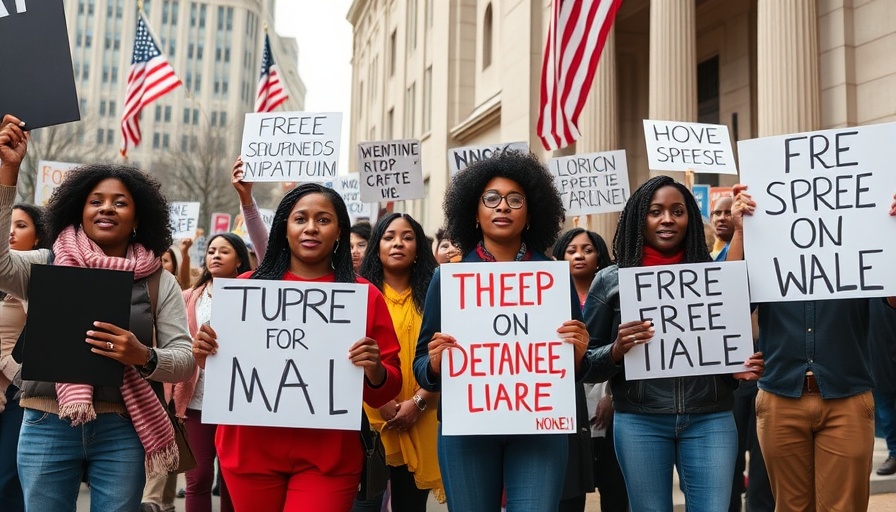
The Case of Badar Khan Suri: A Landmark Decision
In a significant ruling, a federal judge has ordered the release of Georgetown University scholar Badar Khan Suri from immigration detention, signaling a pivotal moment for individuals advocating for Palestinian rights in the United States. Suri, a temporary visa holder originally from India, had been targeted by the previous administration due to his pro-Palestine views. This case mirrors other legal battles faced by students and scholars who have taken a stand for Palestinian advocacy, highlighting a broader issue surrounding freedom of speech and immigration protections in America.
Legal Context and Emerging Trends
The decision issued by US District Judge Patricia Tolliver Giles comes on the heels of similar rulings concerning other students, like Mohsen Mahdawi from Columbia University and Rumeysa Ozturk from Tufts University. Their cases are notable not only for the individuals involved but also as part of a troubling trend seen in immigration enforcement targeting those who express dissenting political opinions. Particularly under the Trump administration’s broad interpretations of immigration law—specifically the Immigration and Nationality Act of 1952—there have been increased vulnerabilities for non-citizens, with threats of deportation looming for individuals based on their political expressions.
Understanding the Implications for Free Speech
The implications of this ruling extend beyond an individual’s release from custody. It raises critical questions about the power of the state and the constitutionality of targeting individuals for their political beliefs, particularly with pro-Palestinian sentiments that have historically faced scrutiny and stigmatization in the US context. Laws that permit deportation due to “potentially serious adverse foreign consequences” remain controversial and challenge the protections typically afforded under free speech rights. This may set a precedent for future cases involving scholars and activists.
Connecting Social Justice and Immigration Advocacy
The voice of advocacy is powerful in the case of Suri, as his wife, Mapheze Saleh, emphasizes the importance of speaking truth to power. Her public gratitude toward supporters demonstrates the essential role of community in these legal battles. The case has galvanized support not just in academic circles but among activists and civil rights advocates across the nation, raising awareness about the intersection of immigration policy and social justice issues surrounding marginalized voices.
Future Perspectives: What Lies Ahead?
Looking ahead, the future of such cases may depend on the evolving landscape of immigration policy and the attitudes of the judicial system toward academic freedom and expression. As legal battles continue, there is anticipation surrounding potential Supreme Court involvement that could define the standards of protection for temporary visa holders. Such rulings could ultimately reshape the framework of immigration law concerning political expression, indicating whether dissent will be tolerated in a climate of increasing scrutiny against pro-Palestinian advocacy.
Understanding the Broader Context of Immigration Enforcement
The decisions affecting Suri and others reflect a pattern in immigration enforcement that targets individuals based on perceived political stances. Reports from the Department of Homeland Security have accused Khan Suri of promoting anti-Semitism and spreading propaganda without substantial evidence, raising alarm among civil liberties organizations. Legal teams, like the one representing Suri, challenge these claims highlighting the importance of evidence-based accusations in the judicial process.
What Can Communities Do?
Communities and institutions must remain vigilant and advocate for the rights of individuals like Suri. Engaging with local representatives, supporting legal defense funds, and participating in rallies can amplify these voices. Addressing issues of immigration rights in tandem with advocacy for international justice is crucial, as each story connects to a larger narrative of oppression and surveillance.
Concluding Thoughts
Badar Khan Suri's release from immigration custody is more than just a personal victory; it draws attention to pressing issues intertwined with freedom of expression and immigration rights in America. As social justice advocates rally together, sustaining momentum is vital to challenge unjust practices and safeguard the right to speak freely. Advocacy can serve as an essential vehicle for change, ensuring that stories like Suri's do not fade from public consciousness.
 Add Row
Add Row  Add
Add 




 Add Row
Add Row  Add
Add 

Write A Comment